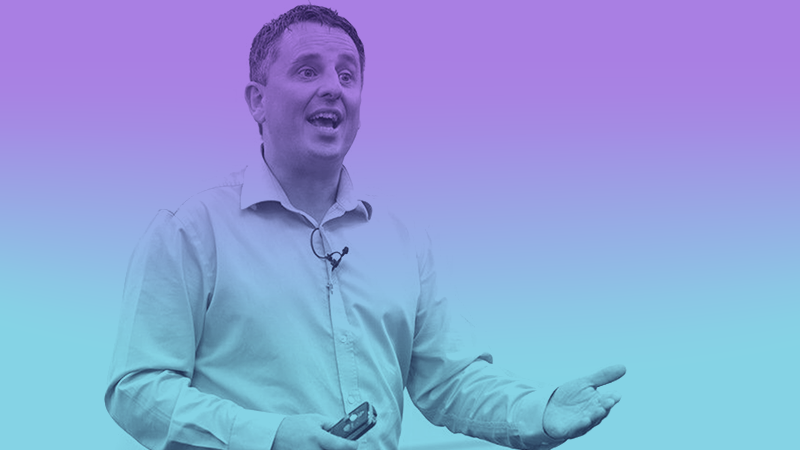Since 2004, we have known that 1 in 5 men suffer from depression after becoming fathers. However, this is still not formally recognised or diagnosed as a form of perinatal depression.
In 2015, the National Childbirth Trust found that 38% of fathers worry about their mental health, and 73% of fathers worry about their partner’s mental health.
In 2018, suicide is the single biggest cause of death in men under the age of 45, with male suicide rates across the UK being 3x higher than female suicide rates.
With this information readily available, why does the World Health Organisation think it isn’t necessary to screen new fathers for perinatal-related depression in the same way new mothers are screened – after all, we all must take care of our mental health.
In 2004, at 30 years of age, I became a father for the first time, and I was totally uneducated about perinatal-depression. I didn’t know what the symptoms were, I didn’t know how to treat it. I didn’t think men could even suffer from it. My approach was very stereotypical and somewhat out-dated – we all have tough situations to deal with, you just get on with it, right? Man-up.
Years later, I realised I had suffered for years in silence.
During the birth of my son, after witnessing what my wonderful wife Michelle went through in labour, I experienced my first panic attack – I thought both Michelle and our baby were going to die, and as a result, even though I was relieved that they were both OK, I didn’t bond with our baby straight away.
Fathers who are dealing with perinatal depression can suffer from symptoms that look a little different than mothers coping with the same illness. Men are more likely to turn to substance abuse, increase alcohol consumption, become emotionally avoidant, work longer hours outside the home, and feel angry and frustrated.
I have spoken with hundreds of fathers about perinatal mental health on social media, in support groups, via Skype and email, in person, and at conferences, and found that many fathers feel incompetent and lack confidence in their skills as a parent, as well as feeling added pressure to due social media and the image of the “perfect family”. These feelings are often compounded by the fact that many dads don’t feel part of the process, and don’t have many paternity services available when they are a soon-to-be parent too.
If I had been screened following the birth of my son, in the same way that my wife was, I believe my depression would have been diagnosed and treated sooner.
It makes sense to look after the physical and mental health of both parents at the same time and it has far more positive outcomes for both the child and the parental unit, giving new parents the best possible start.
From my own experience, and from speaking to dads all over the world, many fathers feel like they are struggling but sadly feel they cannot reach out for help for fear of being labelled “bad dads”, “not good enough”, or “attention seeking”. Only yesterday I spoke to a dad who spends nearly all his time in work or out of the family home, when I asked him why he was avoiding the situation, he replied: “I don’t know if I can be a good dad, and simply can’t bond with my daughter after all these months. I just wish I could run away.”
Paternal depression can affect men of all ages, personality types, and financial status. As with mothers, it is important that perinatal mental health problems in fathers is recognised and treated effectively. Although there are fewer services available to support partners, and men are unable to get a specific perinatal diagnosis, there are still ways for fathers to seek support. speak to health visitor or GP to access community mental health services and perinatal mental health charties. You can also try downloading the Moment Health App from iOS and Android stores to check your symptoms and find support near you.
Today, my life is so much better, and I have found a bigger purpose in campaigning for mental health services for new dads. I didn’t have to “man-up” to develop a relationship with my son, I had to open-up, and I hope that as a result he will feel safe coming to me for support if he ever struggles. I am very happy that Moment Health are including men in their application for new mums and dads, or indeed anyone on a parenting journey.
About the Author
Mark Williams is author of Daddy Blues, international father’s mental health campaigner. Mark also campaigns for the reopen of the MBU in Wales.
2004 but due to no screening was never officially diagnosed As a result, he founded the internationally recognised Fathers’ Mental Health Day and #HowAreYouDad campaign to make sure both parents have mental health support.
Mark has spoken on television programmes and radio stations around the world, and has published articles on the mental health of fathers with Past-President of the International Marce Dr Jane Hanley.
Mark was awarded Inspirational Father of the Year and Local Hero at the Pride of Britain Awards in 2012, and was invited to meet The Royal Family on World Mental Health Day in 2016.
Find out more about Mark and his campaign activities here:
Moment Health is a technology company that aims to prioritise Maternal Mental Health and provide new parents with the tools and knowledge they need to sustain good mental wellbeing – from pregnancy through to parenthood.
The Moment Health app has been developed with clinicians and healthcare professionals. It will screen for perinatal, postnatal and associated anxieties, and include additional features such as a helpful guide to practical and accessible coping strategies.
At Moment Health, our mission is to make maternal mental health mainstream #MakeItMainstream.
Originally published at www.momenthealth.io


